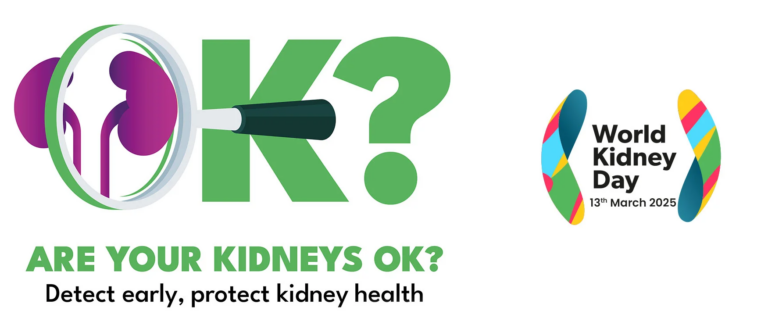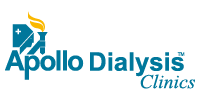
The kidneys are complicated and amazing organs that do many essential tasks to keep us healthy.
The main job of your kidneys is to remove toxins and excess water from your blood.
Kidneys also help to control your blood pressure, to produce red blood cells and to keep your bones healthy.
Each roughly the size of your fist, kidneys are located deep in the abdomen, beneath the rib cage.
Your kidneys control blood stream levels of many minerals and molecules including sodium and potassium, and help to
control blood acidity. Every day your kidneys carefully control the salt and water in your body so that your blood pressure
remains the same.
Did you know?
Your Kidneys:
- Make urine
- Remove wastes and extra fluid from your blood
- Control your body’s chemical balance
- Help control your blood pressure
- Help keep your bones healthy
- Help you make red blood cells
What is Chronic Kidney Disease?
The majority of people are born with two kidneys, each made out of a million tiny units, known as nephrons.
When nephrons are damaged, they stop functioning, placing added strain on the remaining healthy nephrons to
sustain normal kidney function. However, if the damage continues, the remaining healthy nephrons become
insufficient to maintain kidney function.
This progressive loss in kidney function over a span of months or years is called Chronic kidney disease (CKD).
CKD is extremely common, with 1 in 10 of the adult population having some form of kidney damage, and every year millions die prematurely of complications related to CKD.
CKD Facts:
- CKD is a silent disease, people with CKD have no signs or symptoms until the late stage of the disease.
- CKD usually does not go away, instead, it progresses, unless early treatment to slow or halt the disease is ensured.
- CKD can progress to kidney failure – a condition when kidneys cannot maintain their function anymore, posing a life-threatening risk.
- CKD ranks number 7 in the top ten causes of death among noncommunicable diseases worldwide
- CKD increases the risk of premature death from associated cardiovascular disease.
- CKD is more common among certain ethnic groups due in part to high rates of diabetes and high blood pressure.
Symptoms
Most people have no symptoms until CKD is advanced. It is possible for individuals to lose up to 90% of their kidney function before experiencing any major symptoms.
Signs of advancing CKD include:
- Swollen ankles/legs
- Difficulty breathing
- Fatigue
- Difficulty concentrating
- Decreased appetite
- Muscle cramps
- Itchy skin
- Blood in the urine
- Foamy urine
Causes
- Hypertension (high blood pressure) is one of the most common causes of kidney disease. High blood pressure causes just over a quarter of all cases of kidney failure.
- Diabetes – With around one-third of all cases contributing to it, diabetes stands as one of the most common causes of kidney disease. Diabetes is the main cause of ESKD in most developed countries.
- Obesity is linked to the progression of CKD.
- Inflammation (glomerulonephritis).
- Infections (pyelonephritis).
- Sometimes CKD is inherited, such as polycystic kidney disease.
- Longstanding blockages to the urinary system – such as enlarged prostate or kidney stones – can lead to CKD
Medications – certain medications can cause CKD, such as prolonged use of some painkillers (analgesics), certain anti-cancer drugs and herbal medicines. For example, the aristolochic acid contained in Chinese medicine herbs can cause aristolochic acid nephropathy (AAN), which is a progressive renal interstitial fibrosis frequently associated with urothelial malignancies. AAN first reported in Belgium as “Chinese herbal nephropathy”, is characterized by progressive fibrosing interstitial nephritis leading to renal failure and severe anemia.
Aging – CKD is more common with increasing age. After the age of 40, kidney function begins to fall by approximately 1% per year. It is estimated that about one in five men and one in four women between the ages of 65 and 74, and half of people aged 75 and over have CKD.
Treatment in early stages
While there is no cure for CKD, complications can be prevented and progression be slowed down or halted with
proper treatment. It should include:
- Reduction of high blood pressure – control the blood pressure to within the normal range, the slower the GFR declineReduce salt intake to lower blood pressure.
- Control of blood glucose/sugar, lipids and anemia.
- Smoking cessation.
- Increase in physical activity.
- Control of body weight to avoid obesity.
- Treatment: medicines such as angiotensin-converting enzyme inhibitors (ACE inhibitors) or angiotensin recepto
- blockers (ARBs) can significantly delay the progression of CKD, especially in people with diabetes and hypertension,at a relatively low cost. Sodium/glucose cotransporter-2 inhibitors (SGLT2is) is another cost-effective medicine for
- inhibitors (SGLT2is) is another cost-effective medicine for reducing cardiac, kidney and metabolic outcomes in specific populations.
Treatment of End-Stage-Kidney-Disease
For those facing ESKD, long-term dialysis treatment or kidney transplantation is needed to remove wastes and
excess fluid from the blood. Dialysis and kidney transplantation are known as kidney replacement therapies (KRT)
because they attempt to “replace” the normal functioning kidneys.
Read more about: Dialysis Transplantation
Read more about: Dialysis Transplantation
